If a Loving God Exists, Why Do People Suffer?
For a deeper understanding on why God allows suffering, claim your complimentary copy of our Booklet: "John 3:16 Hidden Truths of the Golden Verse" at no cost: https://bit.ly/3JIGZhI. Why is this offer free of charge? It's our commitment to heed Jesus' directive to "freely give" (Matthew 10:8).
In this video presented by Mr. Weston on Tomorrow's World, the central theme revolves around the philosophical conundrum of human suffering in the context of a purportedly loving and omnipotent deity. Weston adeptly addresses common challenges posed by skeptics, atheists, and seekers alike, who grapple with the apparent paradox of a benevolent God coexisting with the pervasive presence of suffering, encompassing everything from wars and diseases to natural disasters and societal injustices.
Weston embarks on a comprehensive exploration, promising to unravel the complexity of this theological dilemma by providing three cogent reasons why a benevolent God might permit suffering. The discourse commences with a nuanced discussion on the existence of God, simplifying the existential inquiry to a binary choice between the cosmos and life therein emerging either as a product of blind chance or as a meticulously crafted creation by an intelligent designer. Leveraging the insights of eminent scholars like Bill Bryson and Michael Denton, Weston elucidates the intricacies of life, particularly emphasizing the astronomical improbability of proteins spontaneously assembling—a phenomenon that underscores the compelling evidence for an underlying intelligent creator.
Transitioning seamlessly, Weston delves into the multifaceted nature of suffering, attributing a significant portion of human anguish to the exercise of free will and the consequences of individual actions. Employing poignant anecdotes and biblical allegories, he illustrates the inherent human propensity towards selfish desires, pride, and disobedience, drawing parallels with the biblical narrative of Adam and Eve's fateful transgression in the Garden of Eden. Through this lens, Weston elucidates how human autonomy often leads to discord, strife, and ultimately, suffering.
Further enriching the discourse, Weston explores the theological concept of God as a compassionate parent who, on occasion, intervenes with corrective measures for the betterment of His children. Citing scriptural passages from Hebrews and Proverbs, he elucidates the notion of divine chastisement as an expression of paternal concern and a catalyst for spiritual growth and moral refinement.
Ultimately, Weston concludes by contextualizing human suffering within the grand narrative of divine providence and redemption, emphasizing the insignificance of temporal afflictions in comparison to the eternal promise of salvation and communion with God. His impassioned discourse underscores the inherent tension between human suffering and divine benevolence, inviting viewers to grapple with the profound complexities of faith, morality, and theodicy.
In summary, Mr. Weston's erudite presentation navigates the labyrinthine terrain of theological inquiry, offering a compelling synthesis of philosophical reflection, scientific inquiry, and scriptural exegesis in addressing the perennial question of human suffering and the enigmatic nature of divine providence.
Questions that this video will answer.
1. Why does the existence of suffering in the world challenge the concept of a loving God?
2. What are three reasons presented in the video for why a loving God allows pain and suffering?
3. How does the video address the question of whether God exists and whether He is truly a God of love?
4. What are the implications of the complexity of life, particularly regarding the likelihood of proteins spontaneously self-assembling?
5. How does the video reconcile the existence of suffering with the belief in an all-powerful and loving God, and what role does human agency play in this context?
-
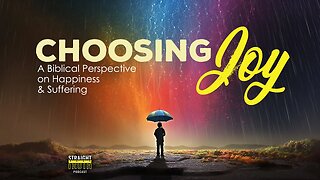 11:15
11:15
Straight Truth Podcast
11 months agoChoosing Joy – A Biblical Perspective on Happiness and Suffering
42 -
 1:00:49
1:00:49
Shalom Adventure Magazine
7 months agoWhy Does God Allow Suffering?
22 -
 12:39
12:39
News from Jesus
1 year agoApril 18, 2016 ❤️ Jesus explains the Meaning of Suffering... Why I allow them and how I use them
72 -
 9:58
9:58
Campbellfamily07
3 months ago“Present Suffering and Future Glory with God” (Romans 8:18-30, NKJV).
43 -
 50:16
50:16
Thinking on Scripture
1 year agoWhen God Uses Trials to Humble, Teach, and Bless Us
176 -
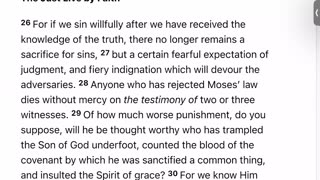 23:07
23:07
Campbellfamily07
8 months agoDAY: 94: "Sympathy with God - (Acts 5:5)- "Stop Willfully Sinning"
89 -
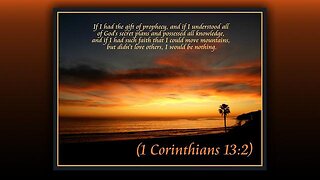 6:42
6:42
StillSmallVoice
3 months agoWhen One Suffers, All Suffer
267 -
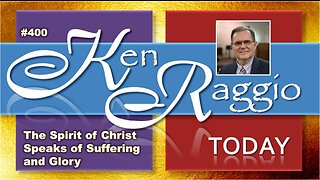 59:27
59:27
kenraggio
1 year agoThe Spirit of Christ Speaks of Suffering and Glory
2761 -
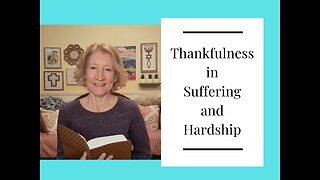 7:04
7:04
Daily God Gems
6 months agoThankfulness in Suffering and Hardship
22 -
 0:40
0:40
HowToBeHealedTV with Christian Diggs
7 months agoHealing Scriptures Concepts 35 📖 Romans 4:19-21 NKJV ✝️ Consider GOD's Promise Not Bad Circumstances
124